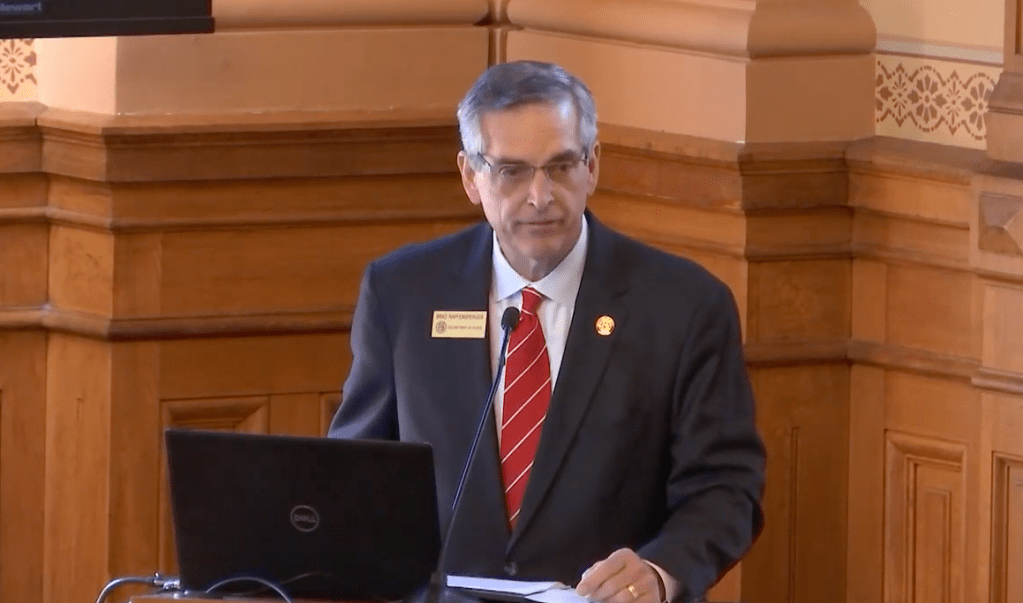Special elections small test for voting system ahead of presidential primary
Published 11:45 am Friday, January 24, 2020

- Secretary of State Brad Raffensperger present to lawyers and answer questions about the new voting system roll-out during budget hearings on Jan. 21 in Atlanta.
ATLANTA — Early voting for House District 171 and Senate District 17 seats is underway, with residents in participating counties using the new $104 million paper-ballot voting system.
There have been no glitches reported in the special elections so far, according to staff in the Secretary of State’s office.
Advance voting is taking place in 12 Southwest counties for the seats left vacant by the deaths of Rep. Jay Powell, R-Camilla, and Sen. Greg Kirk, R-Americus.
A special election for Powell’s seat is scheduled for Jan. 28 — with a Feb. 25 run-off date if needed — and the special election for Kirk’s seat will be held Feb. 4 — with a run-off March 3, if needed.
According to the Secretary of State’s office, Dominion — the company contracted for the new system — has a technician on site to mitigate any potential glitches. The technician will also be on site to “handle issues and to gather lessons” ahead of the March 24 presidential primary — the system’s statewide debut.
Delivering voting machines to the special election counties was bumped up on the to-do list. Each received one touchscreen ballot-marking device for every 225 voters or one new machine for every old machine — with some variation for counties with fewer voters at polling locations and the number of legacy machines each county had, after purchasing extra over the years, according to the Secretary of State’s office.
In Tift County, Elections Supervisor Leila Dollison said they have had 258 early voters since the 13th of this month. Early voting poll workers were the first to be trained, she said.
“It’s new for everybody,” Dollison said, “but we have a Dominion tech with us that helped us with making sure that our poll workers had hands on with the machines.”
Dollison said the new system “wasn’t as scary” as poll workers thought it was going to be.
Despite reports of smooth sailing, critics are still concerned that voting system failures experienced during the Nov. 5 local elections — in the six counties that tested the new touchscreen machines — will happen again.
According to the Secretary of State’s office, there were 45 recorded “incidents” — problems with the machines — out of 27,482 votes cast in the November elections. The state touted an incident rate of 0.164%.
Nearly all of those 45 issues, officials told reporters, were human error or could be have been avoided through additional prior training of poll workers. Lowndes County faced the worst problems, leading to hours of delay for the outcome of the mayor’s race.
The State Election Board this week passed a rule requiring poll workers to remind voters to check their paper ballots before casting them. During public comment, county elections officials told the board they have concerns that the one voting machine per 250 residents ratio would cause long lines at the polls.
During joint budget hearings, Secretary of State Brad Ratffensperger said that 87% of the new machines are scheduled to be delivered to counties — the office is on a strict schedule to deliver 33,000 machines to all 159 counties by the March 24 presidential primary.
Lawmakers questioned Raffensperger about counties that have yet to receive voting equipment and don’t feel prepared.
Gabriel Sterling, chief operating officer for the Secretary of State, pushed back, saying that every county since October 2019 has had the necessary equipment to work on poll-worker training as well as having received three rounds of training sessions across the state. By Feb. 4, he said, all counties will have all of the required system components.
Sterling said the office has a county call twice a week, for local elections officials to have any questions answered directly.
“Right now, we are ahead of schedule in terms of getting the actual equipment out the door and we are on time to both run our special elections in both House District 171 and Senate 13, as well as do another audit…” he said. “If there’s a specific county with a specific question, they have our numbers, they can call us, we talk to them every single day…There’s always going to be people, unfortunately, when you’re going to 159 counties, some are going to be first, some will be last to get the equipment.”


